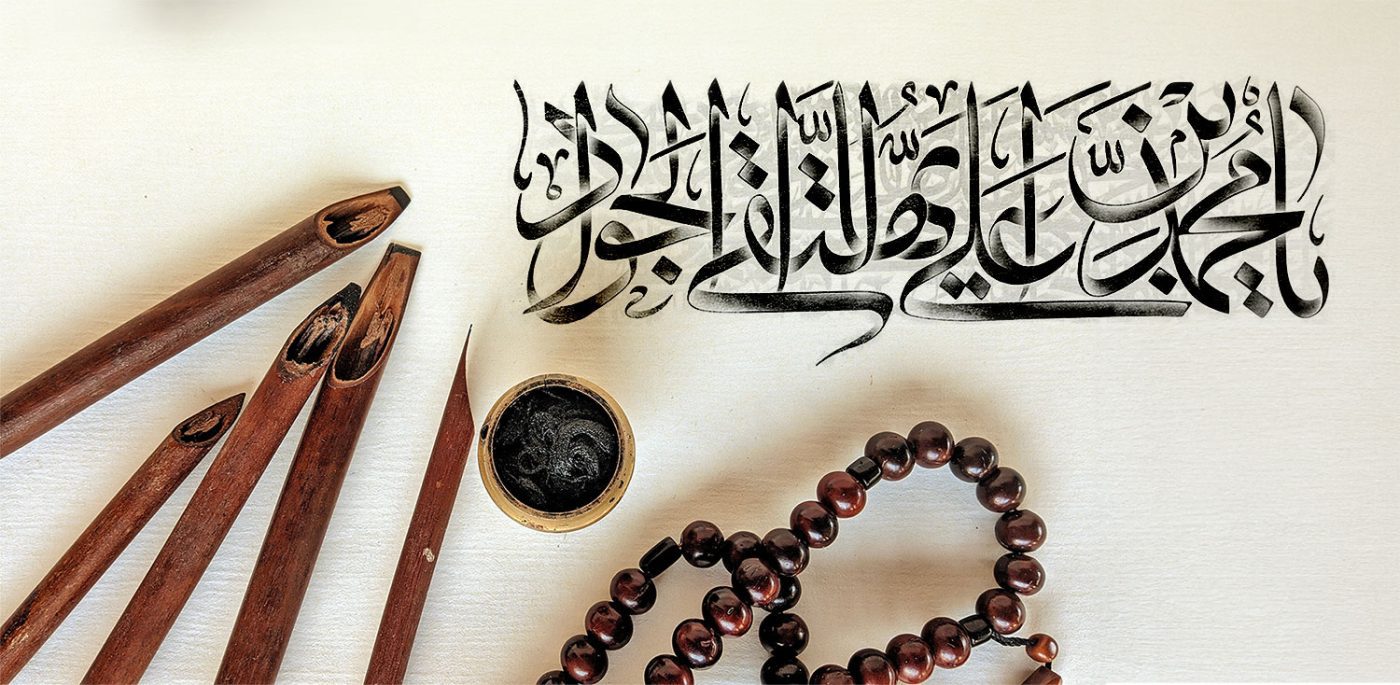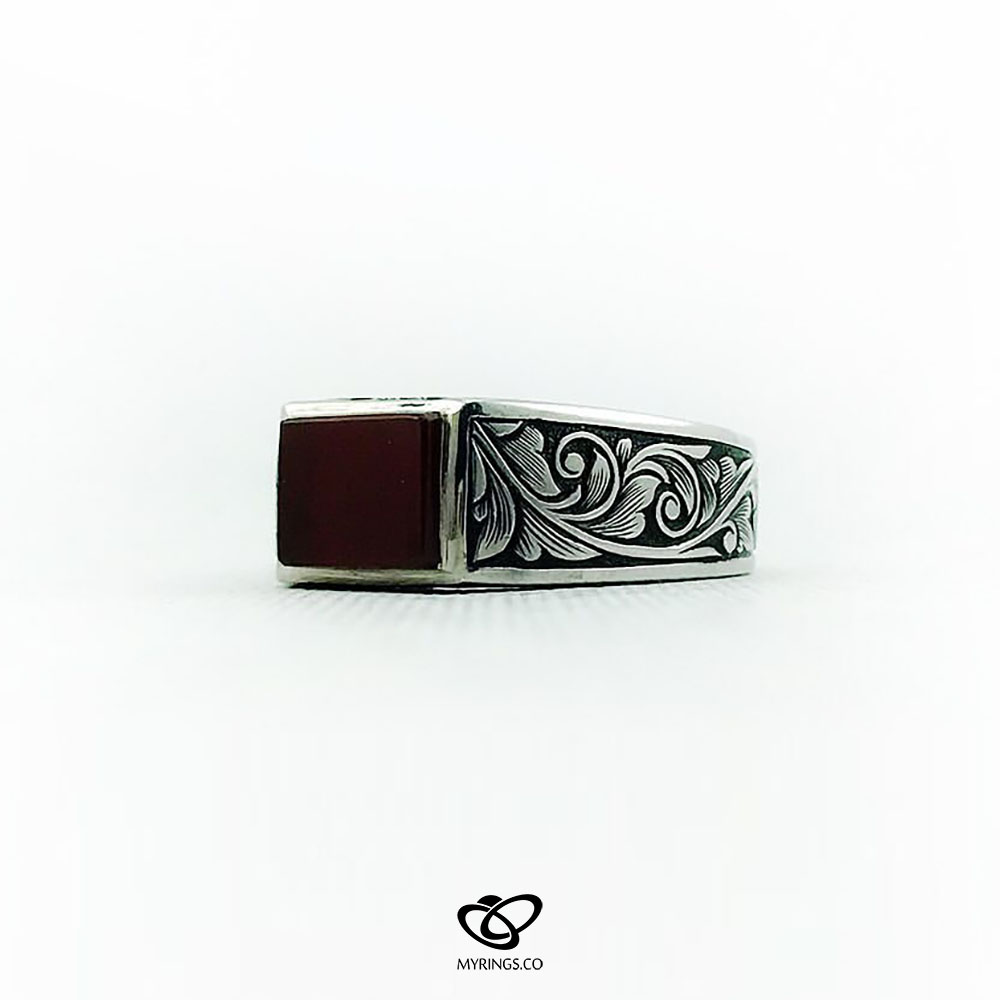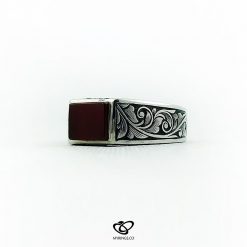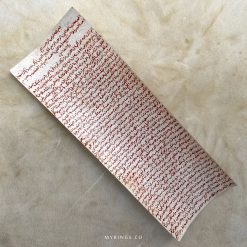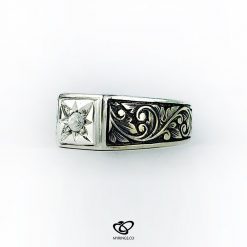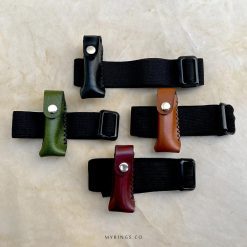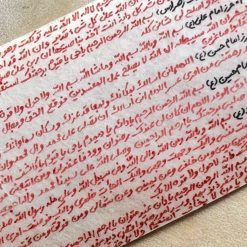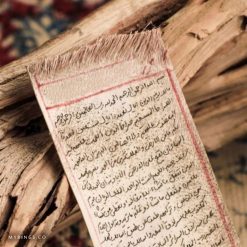Blog
Hirz of Imam Jawad (AS)
What is Hirz Of Imam Jawad (AS)?
The “Hirz of Imam Jawad” is an Islamic amulet that contains verses from the Quran and Islamic supplications. It is written on deer skin under specific conditions and then worn as a wristband or ring. This sacred relic is believed to possess spiritual powers and is used for protection and blessings by those who wear it. The Hirz of Imam Jawad is highly regarded in Islamic tradition and is considered a means of seeking divine assistance and connection.
What is the Hirz of Imam Jawad? Does it offer protection to individuals? Is there a hadith confirming the Hirz of Imam Jawad (as)? What are the properties and applications of Imam Jawad’s Hirz armband? Where can I find the text of the Hirz? Can it be used without ablution? What are the procedures for writing the Hirz prayer of Imam Jawad (as)? Does it have a specific supplication? …
To find answers to these questions and more regarding the Hirz of Imam Jawad (as), stay tuned for detailed explanations.
This respected Hirz has two well-known versions. One is a Saqir (short) version that is usually used inside a ring, and the other is a Kabir (long) version that can be worn as a armband or necklace.
Please note that there are no strict rules regarding how to use it, and you can use it in any way you prefer.
The Short Version (Saqir) Of Imam Jawad Hirz
The small or short Hirz is also known as the prayer “Ya Nur Ya Burhan.” It is typically the size of a line, which we recite together as follows:
یا نُورُ یا بُرْهانُ، یا مُبینُ یا مُنیرُ، یا رَبِّ اکْفِنی الشُّرُورَ وَ آفَاتِ الدُّهُورِ وَ أَسأَلُکَ النَّجَاهَ یَوْمَ یُنْفَخُ فِی الصُّورِ
In the prayer of ‘Ya Nur, Ya Burhan’ by Imam Javad (as), it is advised to seek protection by reciting the following text: “O light, O proof, O obvious, O enlightening! Protect me from the evils and calamities of the time. I seek salvation from you on the Day of Judgment.“
According to this prayer, if you shield yourself with this text, even if the Turkish and Roman armies, along with all the people on Earth, were to confront you, no harm would befall you, and you would be protected.
However, the long Hirz contains an extended prayer, which is presented below this section.
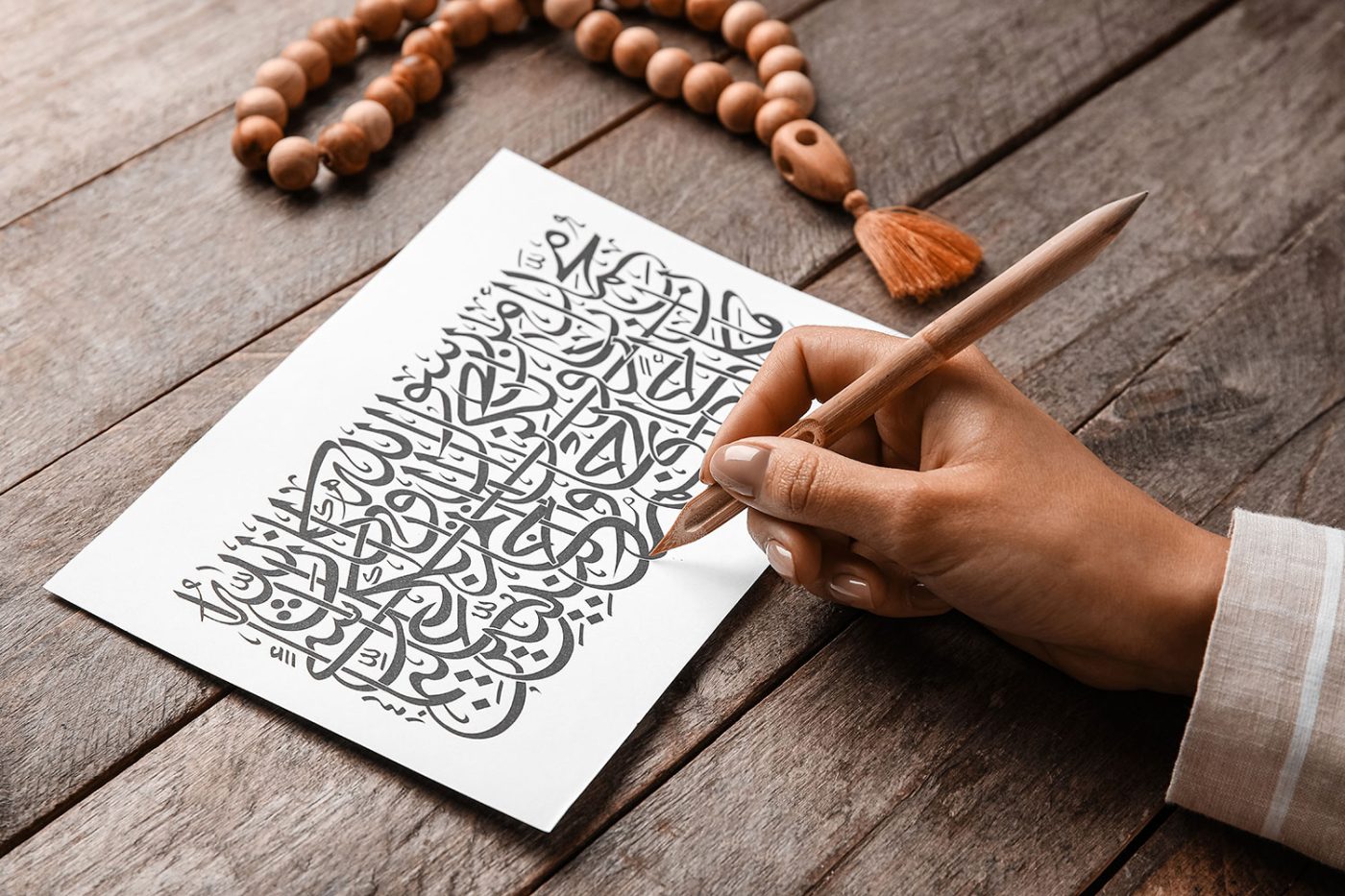
The Long version (Kabir) of imam jawad hirz
In addition to the prayer of “Ya Nur Ya Burhan,” another prayer has been narrated from Imam Javad (AS), which is more famous and is known as the complete Hirz of Imam Javad (AS). The text of Imam Javad’s Kabir Hirz is as follows:

And within the text of Imam Javad’s (AS) Hirz, the secret letters mentioned above are present (please note that these secret letters are mentioned in two valid forms in the sources, and both forms are accepted).
Benefits and Effects of the Noble Hirz (Amulet) of Imam Javad (AS):
In the Islamic faith, various prayers and practices are siggested to ward off disasters and curses from individuals. One of the most renowned among them is the noble Hirz (amulet) prayer attributed to Hazrat Javad (AS). Below is a comprehensive list outlining its benefits and properties.
- Protection from disasters and calamities: The Hirz acts as a shield, providing divine protection against various forms of disasters, such as natural calamities, accidents, and unforeseen misfortunes.
- Protection against the evil eye: Imam Sadiq (AS) narrated: “If you were able to see the causes of death, you would find that a significant portion of deaths is due to the evil eye.” Similarly, the Holy Prophet (PBUH) stated: “The evil eye can cause a person to be buried in a grave and a camel to be placed in a cooking pot.” Thus, one of the primary effects of this Hirz (amulet) prayer is believed to be the repulsion of the evil eye.
- Protection from magic: According to Allama Majlisi, based on the Qur’an and Hadiths, it is understood that magic can have various effects on individuals, such as altering relationships, causing happiness or sadness. However, he emphasizes that magic can be repelled through the recitation of Hirz (amulets) like the one attributed to Imam Javad (AS), as well as reciting certain verses of the Qur’an, and placing trust and hope in Allah (AWJ). Therefore, one of the believed effects of the Hirz (amulet) prayer is to provide immunity and protection from the effects of magic.
- Safeguarding against evil influences and curses: The Hirz serves as a spiritual barrier, protecting the wearer from negative energies, evil eye, and harmful intentions of others. It helps repel curses and shields against malevolent forces.
- Overcoming enemies and adversaries: The Hirz grants strength and resilience to face and overcome enemies and adversaries. It assists in gaining victory over those who seek harm or create obstacles.
- Resilience in the face of hardships and difficulties: By invoking the power of the Hirz, individuals find inner strength and perseverance to endure hardships and face challenges with determination and patience.
- Finding solace and tranquility in times of distress: The Hirz brings comfort and peace of mind during times of distress, offering a sense of serenity and spiritual solace amidst trials and tribulations.
- Guidance and support in making righteous choices: Wearing the Hirz invites divine guidance and assistance, aiding individuals in making righteous decisions and choosing the path of righteousness and virtue.
- Strengthening faith and spiritual connection: The Hirz helps deepen one’s faith and strengthens the spiritual connection with Allah, fostering a closer relationship and enhancing devotion in worship and acts of obedience.
- Divine assistance and intervention in times of need: The Hirz invokes divine intervention, attracting the assistance and support of Allah during times of need, providing solutions and relief when faced with difficulties.
- Warding off the influence of negative energies and evil spirits: The Hirz acts as a shield against negative energies and evil spirits, creating a protective aura that repels their influence and safeguards the individual from their harm.
- Safeguarding physical and mental well-being: The Hirz contributes to the overall well-being by offering protection against physical ailments, mental distress, and negative influences that may affect one’s health and stability.
- Protection from the harm of enemies and ill-wishers: Wearing the Hirz safeguards against the harmful intentions and actions of enemies and ill-wishers, neutralizing their efforts and ensuring one’s safety and well-being.
- Shielding against the effects of black magic and witchcraft: The Hirz acts as a powerful defense against black magic, witchcraft, and other harmful occult practices, providing a protective shield from their negative effects.
- Attaining blessings and favors from Allah: By seeking the blessings of Allah through the Hirz, individuals may receive His favors, abundant blessings, and benevolence in various aspects of life.
- Increased success and prosperity in endeavors: The Hirz is believed to attract divine blessings and favor, contributing to increased success, prosperity, and positive outcomes in one’s endeavors, whether personal or professional.
- Divine mercy and forgiveness: Wearing the Hirz invites the mercy and forgiveness of Allah, providing an opportunity for repentance, forgiveness of sins, and spiritual purification.
- Warding off poverty and destitution: The Hirz is associated with the protection against financial hardships, poverty, and destitution, helping to attract sustenance and provisions from Allah.
- Enhancing piety and devotion: The Hirz aids in strengthening one’s piety, devotion, and commitment to practicing the teachings of Islam, leading to increased spiritual growth and closeness to Allah.
- Repelling doubts and strengthening belief: The Hirz helps dispel doubts and strengthens one’s belief in Allah, His messengers, and the teachings of Islam, promoting unwavering faith and certainty.
- Safeguarding against spiritual and moral deficiencies: The Hirz acts as a spiritual shield, protecting against spiritual and moral deficiencies, enabling individuals to uphold virtuous values and resist temptations.
- Granting peace and tranquility in personal and social life: Wearing the Hirz brings about a sense of inner peace, harmony, and tranquility, positively influencing personal relationships and social interactions.
Remember, the true effectiveness of the Hirz lies in one’s faith, sincerity, and adherence to the teachings of Islam. It is important to have trust in Allah and seek His help and guidance in all matters of life.
Wearing the long Hirz (amulet) of Imam Javad (AS) and reciting the prayer “Ya Noor Wa Ya Burhaan…” known as the “short Hirz” is a way to avail oneself of these properties. By examining the characteristics of the Hirzs (amulets) attributed to the Imams and studying the hadiths and narrations, it can be inferred that possessing either the short or complete Hirz of Imam Javad (AS) can greatly assist in safeguarding ourselves from disasters. This prayer is often worn as an armband or necklace or ring.
SOURCES AND OPINIONS OF some RELIGIOUS LEADERS
The Hirz (amulet) of Imam Javad (AS) has been documented by Sayyid Ibn Tawus in one of his books, and Allameh Majlisi has also referenced it in his work “Bihar Al-Anwar” Volume 91, quoting from Sayyid Ibn Tawus. The act of writing, reciting, and carrying the Hirz of Imam Javad (AS) holds significant efficacy, and its recitation is highly recommended.
Sayyid Ibn Tawus narrates, “It is reported that Ma’mun was victorious in battle against his enemies while wearing this prayer” (Sayyid Ibn Tawoos, Muahajat-ul-Da’wat wa Manhaj-ul-I’badat, p. 61).
Ayatollah Majlisi affirms, “Magic and sorcery are nullified through the use of ‘Ta’wizat’ (prayers narrated from the AhlulBayt (AS)) and verses from the Holy Quran, combined with hope in Allah (AWJ).”
Sayyid Bahr-ul-Ulum describes the amulet of Imam Jawad (AS) as “famous and authentic,” granting permission to encase the prayer in a silver frame.
The late Seyyed Ali Ghazi states, “The amulet of Imam Javad (AS) is tied to the arm, and its efficacy (especially in nullifying magic and spells) is specifically attributed to wearing it on the right arm.”
The late Ayatollah Behjat confirms the significant effect of Imam Javad’s (AS) amulet, stating, “Having the amulet of Imam Javad (AS) is highly effective in warding off the evil eye and invalidating magic and spells.”
Ayatollah Kharrazi recalls, “Even before the Islamic Revolution, the amulet of Imam Javad (AS) was renowned among scholars, and people were aware of its benefits.”
Sheikh Baha’-u-Dini shares an account, stating, “I witnessed a person being struck with a large stone, but I saw that no serious harm came to him because he had the amulet of Imam Javad (AS) with him.”
Imam Javad (AS) himself says, “Protect yourself with this prayer so that if you confront the armies of Romans and Turks, and they all unite against you along with all the people on Earth, you will remain unharmed and protected” (Sayyid Ibn Tawoos, Muahajat-ul-Da’wat wa Manhaj-ul-I’badat, p. 61).
In his book “Bahar-ul-Anwaar” Volume 91, the late Majlisi provides further details about the properties of Imam Javad’s (AS) Hirz. Additionally, Ayatollah Behjat elaborates on the benefits of Imam Jawad’s (AS) amulet and provides instructions on its proper usage in the book “Behjat-u-Dua,” page 348.
THE PROPERTIES OF THE RING OF IMAM JAVAD'S HIRZ
The properties of Imam Javad’s Hirz ring are not distinct from other rings. The special feature of this ring is that it contains the Imam Javad’s Hirz inside it, typically positioned behind the star emblem. As the text inside the ring corresponds to the hirz, the properties of the Hirz ring are aligned with the properties of Imam Javad (AS) hirz. It is common for the ring to feature a stamped star design in cases where there is no gemstone. The presence of the star motif primarily stems from the art of ring making rather than any specific association, such as the Star of David.
Among people, the Hirz ring of Imam Javad is often referred to as the “starred ring” for both men and women. However, other types of stone rings can also be utilized by placing this esteemed prayer behind the gem. By doing so, the wearer can benefit not only from the properties of Imam Javad’s Hirz but also from the properties associated with precious stones like agate, turquoise, and others.
If you intend to use Imam Javad’s Hirz ring, our suggestion is to opt for a silver or gold ring (for women) with precious and symbolic gemstones such as Yemeni Aqeeq, Turquoise, and others. This way, you can benefit from both the effects of Imam Javad’s Hirz and the properties associated with the chosen gemstone.
At MyRings.Co store, we offer the finest Imam Javad’s Hirz, which are inscribed on deer skin using saffron-infused water and Turbah from the Imam Hussein’s shrine (peace be upon him).
Etiquettes and Method of Using Imam Javad's Hirz:
As mentioned earlier, this esteemed prayer is often used as a necklace, armband, or ring. However, the most recommended method to fully benefit from its properties is by wearing it as an armband. To enhance the effectiveness of Imam Javad’s Hirz, follow these steps:
Prayer Method of Imam Jawad (AS) Hirz:
- Perform Wudu (ablution) before starting.
- Find a quiet and clean place to offer the prayer.
- Begin by facing the Qibla (direction of the Kaaba).
- Intend in your heart to perform the specific prayer of Imam Javad’s Hirz.
Offer two * tow Rak’at (units of prayer) (will be 4 Rak’at). In each Rak’at:
- Read Surah Al-Fatihah once
بِسْمِ اللَّهِ الرَّحْمَنِ الرَّحِيمِ ﴿1﴾ الْحَمْدُ للّهِ رَبِّ الْعَالَمِينَ ﴿2﴾ الرَّحْمنِ الرَّحِيمِ ﴿3﴾ مَالِكِ يَوْمِ الدِّينِ ﴿4﴾ إِيَّاكَ نَعْبُدُ وإِيَّاكَ نَسْتَعِينُ ﴿5﴾ اهدِنَا الصِّرَاطَ المُستَقِيمَ ﴿6﴾ صِرَاطَ الَّذِينَ أَنعَمتَ عَلَيهِمْ غَيرِ المَغضُوبِ عَلَيهِمْ وَلاَ الضَّالِّينَ ﴿7﴾ـ
- Ayat al-Kursi seven times
اللَّهُ لا إِلَهَ إِلا هُوَ الْحَیُّ الْقَیُّومُ لا تَأْخُذُهُ سِنَةٌ وَلا نَوْمٌ لَهُ مَا فِی السَّمَاوَاتِ وَمَا فِی الأرْضِ مَنْ ذَا الَّذِی یَشْفَعُ عِنْدَهُ إِلا بِإِذْنِهِ یَعْلَمُ مَا بَیْنَ أَیْدِیهِمْ وَمَا خَلْفَهُمْ وَلا یُحِیطُونَ بِشَیْءٍ مِنْ عِلْمِهِ إِلا بِمَا شَاءَ وَسِعَ کُرْسِیُّهُ السَّمَاوَاتِ وَالأرْضَ وَلا یَئُودُهُ حِفْظُهُمَا وَهُوَ الْعَلِیُّ الْعَظِیمُ
- Surah Al-Imran verse 18 (“Shahdallah”) seven times
شَهِدَ اللَّهُ أَنَّهُ لا إِلَهَ إِلا هُوَ وَالْمَلائِکَةُ وَأُولُو الْعِلْمِ قَائِمًا بِالْقِسْطِ لا إِلَهَ إِلا هُوَ الْعَزِیزُ الْحَکِیمُ
- Surah Al-Shams seven times
بِسْمِ اللَّهِ الرَّحْمَنِ الرَّحِیم
وَالشَّمْسِ وَضُحَاهَا ﴿1﴾ وَالْقَمَرِ إِذَا تَلاهَا ﴿2﴾ وَالنَّهَارِ إِذَا جَلاهَا ﴿3﴾ وَاللَّیْلِ إِذَا یَغْشَاهَا ﴿4﴾ وَالسَّمَاءِ وَمَا بَنَاهَا ﴿5﴾ وَالأرْضِ وَمَا طَحَاهَا ﴿6﴾ وَنَفْسٍ وَمَا سَوَّاهَا ﴿7﴾ فَأَلْهَمَهَا فُجُورَهَا وَتَقْوَاهَا ﴿8﴾ قَدْ أَفْلَحَ مَنْ زَکَّاهَا ﴿9﴾ وَقَدْ خَابَ مَنْ دَسَّاهَا ﴿10﴾ کَذَّبَتْ ثَمُودُ بِطَغْوَاهَا ﴿11﴾ إِذِ انْبَعَثَ أَشْقَاهَا ﴿12﴾ فَقَالَ لَهُمْ رَسُولُ اللَّهِ نَاقَةَ اللَّهِ وَسُقْیَاهَا ﴿13﴾ فَکَذَّبُوهُ فَعَقَرُوهَا فَدَمْدَمَ عَلَیْهِمْ رَبُّهُمْ بِذَنْبِهِمْ فَسَوَّاهَا ﴿14﴾ وَلا یَخَافُ عُقْبَاهَا ﴿15﴾ـ - Surah Al-Layl seven times
بِسْمِ اللَّهِ الرَّحْمَنِ الرَّحِیم
وَاللَّیْلِ إِذَا یَغْشَى ﴿1﴾ وَالنَّهَارِ إِذَا تَجَلَّى ﴿2﴾ وَمَا خَلَقَ الذَّکَرَ وَالأنْثَى ﴿3﴾ إِنَّ سَعْیَکُمْ لَشَتَّى ﴿4﴾ فَأَمَّا مَنْ أَعْطَى وَاتَّقَى ﴿5﴾ وَصَدَّقَ بِالْحُسْنَى ﴿6﴾ فَسَنُیَسِّرُهُ لِلْیُسْرَى ﴿7﴾ وَأَمَّا مَنْ بَخِلَ وَاسْتَغْنَى ﴿8﴾ وَکَذَّبَ بِالْحُسْنَى ﴿9﴾ فَسَنُیَسِّرُهُ لِلْعُسْرَى ﴿10﴾ وَمَا یُغْنِی عَنْهُ مَالُهُ إِذَا تَرَدَّى ﴿11﴾ إِنَّ عَلَیْنَا لَلْهُدَى ﴿12﴾ وَإِنَّ لَنَا لَلآخِرَةَ وَالأولَى ﴿13﴾ فَأَنْذَرْتُکُمْ نَارًا تَلَظَّى ﴿14﴾ لا یَصْلاهَا إِلا الأشْقَى ﴿15﴾ الَّذِی کَذَّبَ وَتَوَلَّى ﴿16﴾ وَسَیُجَنَّبُهَا الأتْقَى ﴿17﴾ الَّذِی یُؤْتِی مَالَهُ یَتَزَکَّى ﴿18﴾ وَمَا لأحَدٍ عِنْدَهُ مِنْ نِعْمَةٍ تُجْزَى ﴿19﴾ إِلا ابْتِغَاءَ وَجْهِ رَبِّهِ الأعْلَى ﴿20﴾ وَلَسَوْفَ یَرْضَى ﴿21﴾ـ - Surah Al-Ikhlas seven times.
بِسْمِ اللَّهِ الرَّحْمَنِ الرَّحِیم
قُلْ هُوَ اللَّهُ أَحَدٌ ﴿1﴾ اللَّهُ الصَّمَدُ ﴿2﴾ لَمْ یَلِدْ وَلَمْ یُولَدْ ﴿3﴾ وَلَمْ یَکُنْ لَهُ کُفُوًا أَحَدٌ ﴿4﴾ـ
Once you have completed the prayer, tie the prayer to your right arm.
Prayer Imam Javad’s Hirz for children and disabled people
If you intend to use the Hirz prayer of Imam Javad (AS) for a child or someone who is unable to pray, you may appoint a person to perform the prayer on their behalf. It is important to observe the proper etiquette to fully benefit from wearing Imam Javad’s Hirz.
Writing the Hirz on deer skin is recommended and is considered part of its etiquette. Although some Hirz may be written on cloth, paper, or the back of a ring, the most complete form is when it is written on deer skin, as stated in narrations.
At Myrings.co, we provide the opportunity for our valued customers to acquire the Imam Javad’s Hirz armband, allowing them to benefit from its maximum properties.
PROPERTIES OF IMAM JAVAD'S HIRZ QUOTED BY AYATOLLAH BAHJAT
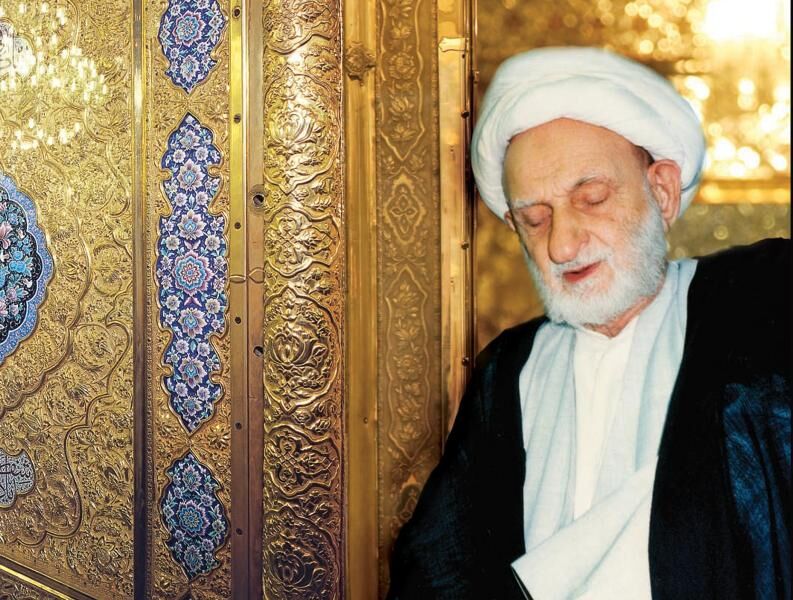
Regarding the properties and benefits of Imam Javad’s Hirz (amulet), Ayatollah Bahjat states:
“To safeguard against dangers and diseases, protect from the influence of devils and malevolent beings, alleviate nightmares, counteract magic and sorcery, it is highly recommended to keep this prayer with you. It also serves as an effective measure against the evil eye.”
In response to inquiries about jealousy, devilish influences, disturbed dreams, and the like, Ayatullah Bahjat always emphasized the recitation of the four Surahs, namely “Al-Ikhlas, Al-Nas, Al-Falaq, and Al-Kafiroon,” collectively known as the “Four Quls.” Additionally, he recommended having Imam Javad’s Hirz (amulet) in one’s possession as a means of protection.
Let us read Ayatollah Behjat’s viewpoint on the properties of Imam Javad’s Hirz (amulet):
“I typically refrained from asking my teacher, Ayatollah Qazi, about specific ‘dhikr’ (remembrance of Allah), but on certain occasions, he willingly shared insights. For instance, the Hirz (amulet) prayer of Imam Javad (as), when worn on the upper arm, provides immunity to the wearer. It is also effective in nullifying the effects of magic and spells. Importantly, one should wear it specifically on the upper arm for maximum benefit.”
Ayatollah Bahjat recommended several additional practices alongside having the Hirz (amulet), including:
- Reciting and displaying the Ayat-ul-Kursi verse at home.
- Reciting the four Surahs of “Al-Ikhlas, Al-Nas, Al-Falaq, and Al-Kafiroon” (known as the “Four Quls”) and repeating them, particularly before bedtime.
- Carrying a small Quran with you at all times.
- Reciting the Mu’awzatin (Surahs of Al-Falaq and Al-Nas).
- Reciting the “Adhan” (call to prayer) with a relatively loud voice during its designated times.
- Reading 50 verses of the Holy Quran with a relatively loud voice during the daytime.
These practices were recommended by Ayatollah Bahjat as additional measures to enhance spiritual protection and seek blessings.

